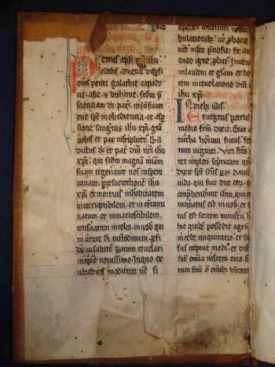"This Word Is the Good News" -- 1 Peter 1:13-25
 Tuesday, February 16, 2016 at 11:15AM
Tuesday, February 16, 2016 at 11:15AM 
The Third in a Series of Sermons on 1 Peter
If you are a believer in Jesus Christ, then you are also a citizen of the heavenly kingdom. Our heavenly citizenship also means that we are, in a sense, resident aliens in the land in which we live (in our case, the United States of America). In light of our dual citizenship, the question raised by our text is what, if anything, distinguishes us from the non-Christians around us? The answer to this question is to be found in the simple fact that Christianity is not a culture, but a system of doctrine. Generally speaking, Christians do not identify themselves by wearing a unique Christian costume (clothing, hairstyle, etc.). Or by eating or not eating certain foods. Or by withdrawing from daily life and keeping to ourselves in Christian communities isolated from the non-Christians around us. There are notable exceptions to be sure–but these are exceptions nonetheless. The Amish wear distinctive clothing and avoid modern “worldly” contrivances, the Seventh Day Adventists follow certain dietary laws, and there are orders in the Roman church which cloister themselves so as to be fully devoted to a life of contemplation, or to support vows of celibacy, poverty, or silence. But Peter mentions none of these things when writing his first letter to Christian exiles in Asia Minor. The Apostle exhorts Christian aliens to identify ourselves as citizens of heaven by our doctrine (what we profess about the Triune God) and by our conduct, (we strive to be holy as the Lord is holy). This is how we as Christians distinguish ourselves from the non-Christians around us–our doctrine and life.
As we continue our series on 1 Peter, we move further into the opening chapter where Peter describes how Christian aliens are to conduct themselves during their earthly sojourn. Peter is writing to a group of struggling Christians scattered throughout Asia Minor (Turkey). His readers/hearers had been displaced from their homes several years earlier as a result of a decree by the Roman emperor Claudius, who granted confiscated land to retired Roman soldiers in the regions mentioned by Peter. There is a sense in which all Christians are similarly “elect exiles”–the term Peter uses when referring to Christians hearing and reading this letter. What Peter says to those elect exiles uprooted by the Diaspora in the first century, also applies to us. How do we conduct ourselves as resident aliens in the modern world in light of Peter’s exhortation to those in first century Asia Minor to live holy lives ?
In the opening section of 1 Peter, the Apostle points to the final outcome of God’s grace in Jesus Christ (the salvation of our souls) as the means of encouraging struggling exiles during difficult times. Christians pilgrims should keep the big picture in mind (God will save us from our sins) during the time we must endure our earthly struggles. If the previous section of Peter’s letter focused upon our eternal hope and heavenly inheritance (vv. 3-12), then in our text (vv. 13-25) Peter deals with how Christians are to conduct themselves in this life, before they realize their heavenly inheritance in the next. Having the living hope which Peter described in verse 3–that God will preserve us through the same power manifest when he raised Jesus from the dead–how then ought we live in the here and now?
As we turn to our text, we should take note of the obvious change in subjects between verse 12 and verse 13, evident in Peter’s use of the conjunction “therefore” (dio). What follows (in vv. 13 ff) is an exhortation from the Apostle to take action based upon the previous unpacking of the gospel as the basis for the living hope which God’s people possess through faith in Jesus Christ. There are three imperatives (commands) given us by Peter. First, we are to fix our hope upon Jesus (v. 13). Second, we are to live holy lives which reflect the holiness of our creator and redeemer (vv. 14-16). Third, we are to live in the fear of the Lord, because the one we invoke as our Father is also judge of all the earth (v. 17-19).
To read the rest of this sermon: Click Here


Reader Comments